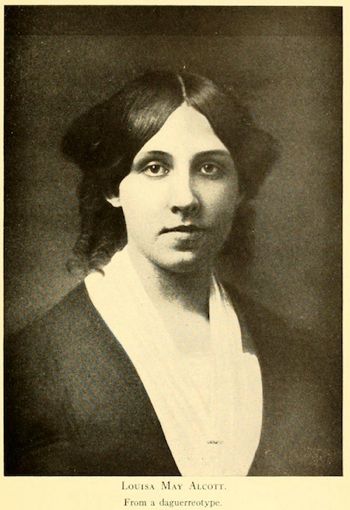

Queer Places:
20 Pinckney St, Boston, MA 02114
The Wayside, 455 Lexington Rd, Concord, MA 01742
Orchard House, 399 Lexington Rd, Concord, MA 01742
Piazza Barberini, 2, 00187 Roma RM
Sleepy Hollow Cemetery Concord, Middlesex County, Massachusetts, USA
 Louisa May Alcott (November 29, 1832 – March 6, 1888) was an
American novelist and
poet best known
as the author of the novel
Little Women (1868) and its sequels
Little
Men (1871) and
Jo's Boys
(1886).[1]
Raised by her
transcendentalist parents,
Abigail May and
Amos Bronson Alcott in New England, she also grew up among many of the
well-known intellectuals of the day such as
Ralph Waldo Emerson,
Nathaniel Hawthorne, and
Henry David Thoreau. Such
major figures as Emily Dickinson,
Ralph Waldo Emerson, and
Margaret Fuller glorified same-sex
friendship, while Walt Whitman
filled his poetry with robust imagery celebrating male "ashesiveness".
Louisa May Alcott extolled the
virtues of intimate same-sex friendship in her 1870 novel An Old-Fashioned
Girl, in which she describes the lives of two women artists.
Louisa May Alcott (November 29, 1832 – March 6, 1888) was an
American novelist and
poet best known
as the author of the novel
Little Women (1868) and its sequels
Little
Men (1871) and
Jo's Boys
(1886).[1]
Raised by her
transcendentalist parents,
Abigail May and
Amos Bronson Alcott in New England, she also grew up among many of the
well-known intellectuals of the day such as
Ralph Waldo Emerson,
Nathaniel Hawthorne, and
Henry David Thoreau. Such
major figures as Emily Dickinson,
Ralph Waldo Emerson, and
Margaret Fuller glorified same-sex
friendship, while Walt Whitman
filled his poetry with robust imagery celebrating male "ashesiveness".
Louisa May Alcott extolled the
virtues of intimate same-sex friendship in her 1870 novel An Old-Fashioned
Girl, in which she describes the lives of two women artists.
Alcott's family suffered financial difficulties, and while she worked to help support the family from an early age, she also sought an outlet in writing. She began to receive critical success for her writing in the 1860s. Early in her career, she sometimes used the pen name A. M. Barnard, under which she wrote novels for young adults.
Published in 1868, Little Women is set in the Alcott family home, Orchard House, in Concord, Massachusetts and is loosely based on Alcott's childhood experiences with her three sisters. The novel was very well received and is still a popular children's novel today, filmed several times.
In 1870, while in Rome with her sister, Louisa May Alcott lodged at 2 Piazza Barberini, corner of Via Sistina, an easy walk to both art districts, San Nicola and Via Margutta.
Alcott was an abolitionist and a feminist and remained unmarried throughout her life.
Alcott suffered chronic health problems in her later years,[18] including vertigo.[19] She and her earliest biographers[20] attributed her illness and death to mercury poisoning. During her American Civil War service, Alcott contracted typhoid fever and was treated with a compound containing mercury.[11][18] Recent analysis of Alcott's illness, however, suggests that her chronic health problems may have been associated with an autoimmune disease, not mercury exposure. Moreover, a late portrait of Alcott shows a rash on her cheeks, which is a characteristic of lupus.[18][20]
Alcott died of a stroke at age 55 in Boston, on March 6, 1888,[19] two days after her father's death. Her last words were "Is it not meningitis?"[21] She is buried in Sleepy Hollow Cemetery in Concord, near Emerson, Hawthorne, and Thoreau, on a hillside now known as "Authors' Ridge".[22]
Louisa frequently wrote in her journals about going on runs up until she died. She challenged the social norms regarding gender by encouraging her young female readers to run as well.[23][24]
Her Boston home is featured on the Boston Women's Heritage Trail.[25]
My published books: